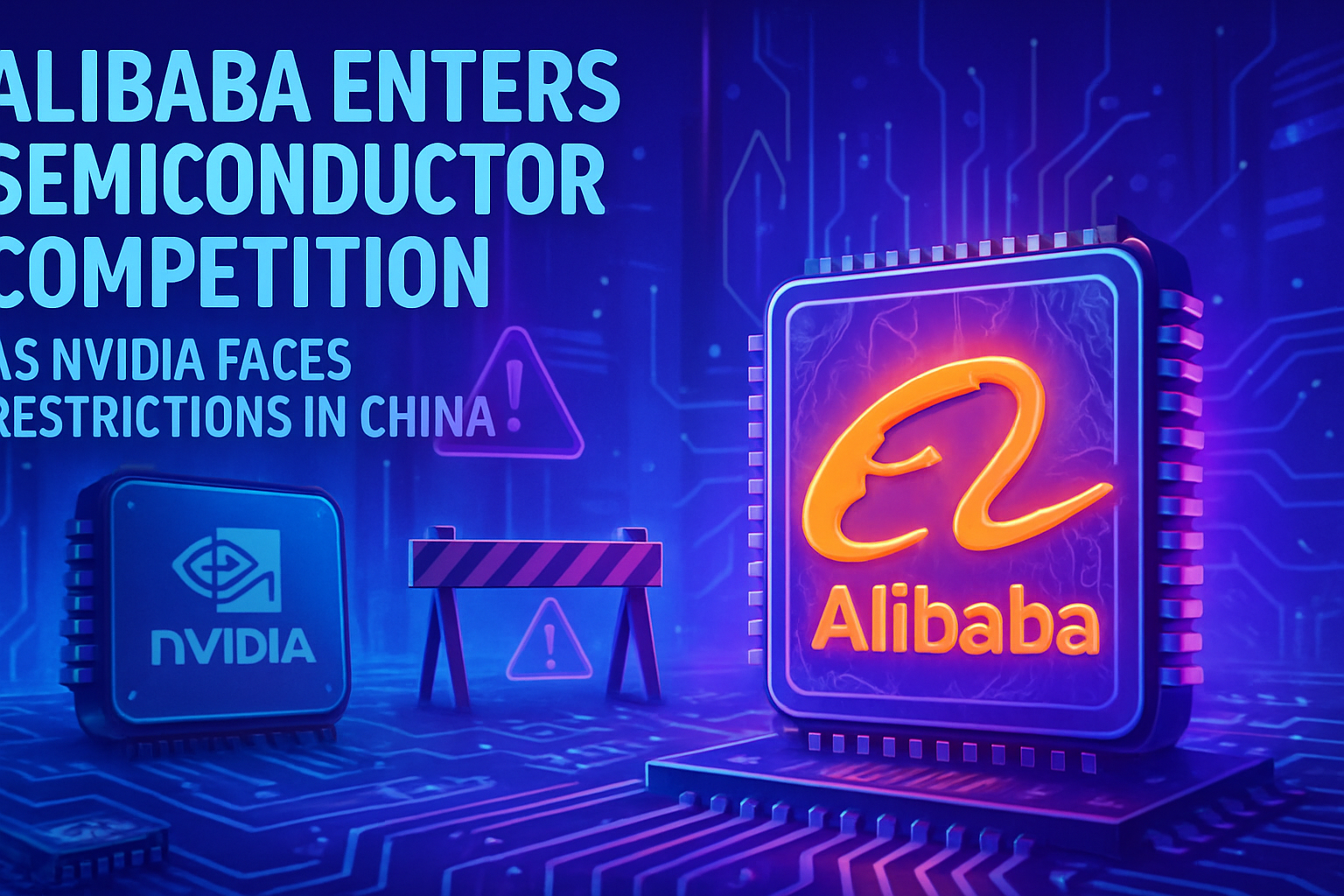Alibaba emerges in the semiconductor sector in response to the challenges of increased international competition. Restrictions imposed by Washington disrupt supply chains, offering Alibaba a strategic opportunity. The launch of its new processor promises unprecedented versatility, a significant advantage in the face of potential shortcomings from its competitor.
The artificial intelligence market is booming, with exponential demand for high-performance inference solutions. This context, marked by unprecedented enthusiasm, highlights the importance for Alibaba to strengthen its position.
Nvidia, facing obstacles in China, sees its prospects darkening while leaving room for other players. Alibaba’s response could redefine the stakes and create new dynamics in a rapidly changing market.
Alibaba Amplifies Its Presence in the Semiconductor Sector
Alibaba (NYSE:BABA) is intensifying its efforts in the semiconductor field by launching a new processor. The latter stands out for its increased versatility compared to previous designs, according to a report from the Wall Street Journal. This new chip has been specifically designed for AI inference, allowing pre-trained models to analyze new data.
Collaboration with Nvidia Technology
Unlike many local competitors, Alibaba’s processor is compatible with the Nvidia (NASDAQ:NVDA) platform. This feature allows engineers to reuse programs developed for Nvidia hardware, thus providing Alibaba with a clear advantage. Chinese companies are striving to fill the void left by U.S. export restrictions.
Impact of American Restrictions on Nvidia
Nvidia’s access to the Chinese market faces significant obstacles. The H20, its most advanced processor capable of being sold in China, has encountered new difficulties. Although Washington approved shipments in July, Beijing quickly advised companies to suspend their activities due to security concerns. These restrictions open the door to alternatives provided by players like MetaX (NASDAQ:META) and Huawei.
Challenges of Local Chips
Engineers have expressed concerns about the reliability of domestic chips, highlighting that they often face overheating and failure issues during training sessions. While Alibaba’s chip will not entirely resolve China’s shortcomings in AI model training, it could improve efficiency during inference, where demand is skyrocketing.
Alibaba’s Revenue Growth
Alibaba’s Cloud Intelligence group recently reported a 26% revenue growth. AI-related sales have shown triple-digit growth for the eighth consecutive quarter. This performance reflects the growing enthusiasm for artificial intelligence solutions, propelling Alibaba to the forefront of the technology sector.
Overview of Geopolitical Tensions and the Industry
Ongoing geopolitical tensions further complicate the landscape for technology players, with Washington urging Tokyo to restrict exports to China. Several articles have discussed this dynamic, especially those reporting that Washington is urging Tokyo to tighten restrictions.
In this tense context, the semiconductor landscape is transforming, bringing both challenges and opportunities for companies like Alibaba.
The Future of Nvidia in China
With increasingly strict restrictions, Nvidia’s future in the Chinese market appears uncertain. Recent articles have highlighted the challenges faced by the company, particularly regarding the availability of powerful chips, as discussed in this article.
Frequently Asked Questions
What drives Alibaba to develop new semiconductors for AI?
Alibaba aims to strengthen its position in the AI chip market in response to the restrictions imposed on Nvidia, creating an urgent need for local alternatives.
How does Alibaba’s new processor differ from its previous models?
Alibaba’s new processor is more versatile, specifically designed for AI inference, and compatible with Nvidia’s platform, facilitating the reuse of existing programs.
What impact do U.S. export restrictions on Nvidia have on the semiconductor market in China?
These restrictions have created a gap in the market, prompting companies like Alibaba to develop alternative solutions to meet growing demand.
What challenges does Alibaba face in developing its own AI chips?
Although Alibaba has made strides, challenges include the need to improve chip performance, particularly during AI model training, where many local chips encounter overheating issues.
What is the impact of revenue growth in Alibaba’s Cloud Intelligence group on the development of its AI chips?
The strong revenue growth, especially related to AI, justifies Alibaba’s continued investment in semiconductor development to meet ever-growing demands.
How do Chinese companies like Huawei position themselves against Alibaba’s rise in the semiconductor sector?
Huawei and other companies are trying to develop their own solutions but face similar challenges in terms of technology and performance.
What opportunities does the semiconductor market offer to Alibaba compared to companies like Nvidia?
The market presents significant opportunities for Alibaba, particularly in the rapidly expanding field of AI applications, where the need for tailored and local solutions is increasingly pressing.






